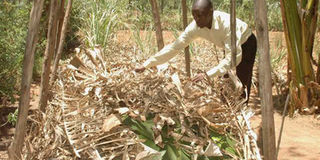Compost manure increases yields, study

A farmer demonstrates the process of making compost manure at the compost manure site at Ichina Organic farming demonstration plot, Kakamega. Research carried out by several institutions says compost manure helps in producing more yields and replenishing the soil. FILE PHOTO | JACOB OWITI | NATION MEDIA GROUP
What you need to know:
- The field experiments in Kenya are part of a large long-term Farming Systems Comparison (SysCom) programme, which is aimed at obtaining scientific evidence on the benefits and drawbacks of organic and conventional farming systems in the Tropics.
- In organic farming, soil fertility improved significantly in calcium, magnesium, potassium and soil pH (acidity) levels under the organic approach while in conventional farming one had to spend money to replenish soil fertility.
- Dr Anne Muriuki said the ultimate objective of the programme is to support affordable farming practices that local farmers can adopt with ease, and individually run on their farms at no cost since locally available farm wastes are used to make compost.
A study involving research institutes and a local university has supported the use of compost manure in farming, saying its yields are higher than those of hybrid crops grown using fertiliser.
Speaking after visiting two fields in Thika and Chuka, where trials have been carried out since 2007, Project Co-ordinator, Dr Noah Adamtey said maize yields grown under organic farming were similar to those grown under conventional production, with high-input systems representing commercial scale farming.
“Furthermore, the profitability was similar in both systems from the third year in the absence of premium price, but when premium price was considered, organic farming was more profitable starting from the fifth year,” he said.
The researchers added that at low input levels, maize yields were similar in both systems, especially under intercropping systems and there were no differences for pest and disease incidences and damage.
In organic farming, soil fertility improved significantly in calcium, magnesium, potassium and soil pH (acidity) levels, while in conventional farming one had to spend money to replenish soil fertility.
The six year study was jointly conducted by private and public farms managed by the Swiss Research Institute (FiBL), International Centre of Insect Physiology and Ecology (ICIPE), Kenya Agricultural and Livestock Research Organization (KALRO), Kenyatta University, Kenya Organic Agriculture Network and the Kenya Institute of Organic Farming.
It demonstrates that the organic systems start to deliver substantial economic advantage over conventional systems as soon as the initial conversion phase is over.
ON-FARM RESEARCH
The field experiments in Kenya are part of a large long-term Farming Systems Comparison (SysCom) programme, which is aimed at obtaining scientific evidence on the benefits and drawbacks of organic and conventional farming systems in the Tropics.
In addition to the long-term research, SysCom Programme uses the approach of participatory on-farm research to develop and promote locally adaptable agricultural practices for organic farming where farmers are actively involved in every step of the project.
“The involvement of farmers is of high value and will help us find practical and adoptable solutions to farming challenges for SysCom project sites that offer suitable platforms for innovation development,” explained SysCom programme Overall Co-ordinator Dr Gurbir Bhullar.
This year, there were 60 farmers trained on compost making and best uses of biomass, as part of the many farmers in the two regions, trained on sustainable farming practices since 2009.
KALRO’s Dr Anne Muriuki said the ultimate objective of the programme is to support affordable farming practices that local farmers can adopt with ease, and individually run on their farms at no cost since locally available farm wastes are used to make compost.
“Organic farming offers a huge potential for promoting sustainable agriculture in Kenya, however the necessary policy framework needs to be put in place, the market differentiated between organic and conventional farming and certification made more affordable to local farmers” she added.





